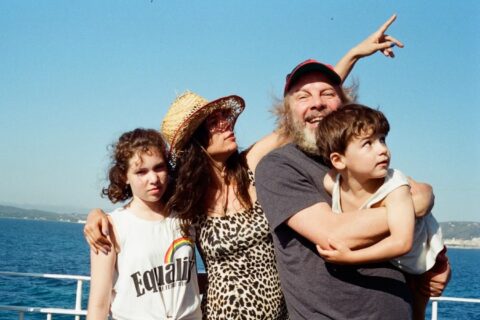“Nothing’s happening.”
“Everything’s happening!”
I’m always baffled when people name their film after another film, especially when it is a beloved classic. Why would you name your film L’Aventura (Sophie Letourneur, 2025) when one of the greatest films of all time, getting as high as number two(!) on the decennial Sight and Sound Poll in 1962, is already called L’Avventura (Michelangelo Antonioni, 1960)? It is worth pointing out that there is an extra V in the Italian spelling of “The Adventure” as opposed to the Corsican version, yet there is simply no way that the distinguished filmmaker Letourneur doesn’t know about the Italian classic.
But perhaps instead of bending under the anxiety of influence, Letourneur, who sets a large part of her slice-of-life family comedy in Sardinia, purposefully looks to evoke Antonioni’s work as a purposeful form of no-stakes contrast. While the famed 60s auteur’s film is a seminal text on existentialism and moody compositions, Letourneur’s ACID section opener, telling the story of a family travelling through both Corsica and Sardinia, is the very definition of a hangout movie; loose, shaggy and perfectly amiable.
The second film in a planned trilogy about French people travelling through Italy, L’Aventura reunites director-star Letourneur with co-star Philippe Katerine, playing the couple Sophie and Jean-Fi. This time Sophie has brought her two children with her; the smart and perceptive pre-pubescent teen Claudine (Bérénice Vernet) and the four- or five-year-old chaos generator Raoul (Esteban Melero). With an extremely keen eye for the small details that compromise a family holiday, as well as the way that those same details change in the retelling, this film is a pleasure to watch, even if almost nothing of consequence happens.
Perhaps the closest version in English cinema is the Trip series (Michael Winterbottom, 2010-20), with Steve Coogan and Rob Brydon playing versions of themselves hanging out, starting in the Lake District before making it across the Mediterranean. But while Anglo storytelling tradition usually dictates that there has to be some kind of deep drama hidden behind all those gorgeous sunsets — I remember the death of a father in the Greek one — L’Aventura is perfectly happy with finding meaning within the quotidian details of everyday life; children needing the toilet, stopping off by the beach, getting sand in your shoe, the smell of the hotel room when you arrive, walking through a bustling city market, so on and so forth.
As the trip continues, Claudine constantly records her mother and stepfather debating about what they really did each day, bringing to mind Don DeLillo’s quote that “the family is the cradle of the world’s misinformation.” But there is also great joy and a lot of love in the way this family is depicted, told without a trace of sentimentality, and the dialogue always rings with the truth of genuine banality. Unfortunately, this can sometimes translate to the film feeling slight at moments, yet at others, Letourneur hits on ideas and images often neglected in contemporary cinema; life as it is lived, the beauty of the present moment slipping away even in the telling.
Redmond is the editor-in-chief of Journey Into Cinema.

